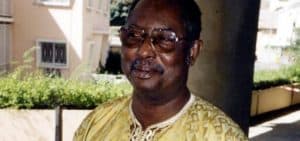Deyda Hydara
Gambia
Status: Murdered

Deyda Hydara was an eminent Gambian journalist and newspaper publisher, and a fierce critic of President Yahya Jammeh’s censorship of journalists and the media. On December 16, 2004, he was assassinated by two unidentified gunmen while driving home from The Point’s offices in Banjul, Gambia; it is thought that the government was complicit in Hydara’s assassination. Deyda Hydara was posthumously named a recipient of the PEN/Barbara Goldsmith Freedom to Write Award in 2005. According to reports, on May 18, 2017, a court in the Gambia issued arrest warrants for two suspects in the murder. On July 22, 2019, it was revealed that then-President Yahya Jammeh was the mastermind behind the assassination of Hydara in 2004.
Case History
Deyda Hydara began his career in journalism in 1974, when Agence France-Presse hired him as a translator and then as a local correspondent. In 1991 he co-founded The Point, a tabloid that appears three times a week, with his friend of 35 years, Pap Saine. When The Point first appeared, it was the only newspaper of its kind, offering independent news and powerful editorials voicing opposition to successive regimes in the Gambia. As a senior independent journalist in the Gambia, Hydara also served as a mentor for many of the country’s young reporters.
On December 16, 2004, Deyda Hydara was shot in the head and chest by unidentified gunmen. He died instantly. The shooting occurred two days after the Gambian National Assembly passed a new round of repressive media legislation that imposed mandatory prison terms for any published work judged to be “seditious” or “libelous” and included prison terms of at least six months for first-time infractions and three years for repeat offenders. The bill also increased the scope of what might be deemed libelous. Hydara and other independent journalists had publicly opposed the law and Hydara had published an editorial denouncing it the day before he was killed.
Hydara’s murder came amid an alarming crackdown by Gambian authorities on the independent press. In July 2002 the government passed legislation requiring journalists and media organizations to register with a media commission for one-year renewable licenses. In September 2003, Hydara and three other independent journalists filed a lawsuit challenging the law, and in response, a group known as the “Green Boys,” which had links to the ruling party, issued numerous threats against the co-plaintiffs in the suit and a number of independent journalists, several of whom suffered harassment, physical assaults, and arson attacks.
A suspect was briefly arrested but released, and the investigation into Hydara’s murder was closed without being solved. On June 14, 2014, the Economic Community of West African States (ECOWAS) Court of Justice found that the Gambian government did not properly investigate Hydara’s murder, as the state’s intelligence agency was not impartial.
Deyda Hydara was working to establish a new PEN center in the Gambia at the time he was murdered. In 2005 he was posthumously named a recipient of the PEN/Barbara Goldsmith Freedom to Write Award.
According to reports, on May 18, 2017, a court in the Gambia issued arrest warrants for two Gambian soldiers and former members of paramilitary hit squad the Jungalars, Major Sanna Manjang and Colonel Kawsu Camara, both named as suspects in the murder. Manjang has reportedly fled the country, Camara’s whereabouts are unknown. The warrants for their arrest are part of a broader effort on the part of Gambian President Adama Barrow to counteract human rights violations perpetrated by his predecessor.
On July 22, 2019, In testimony before Gambia’s Truth, Reconciliation, and Reparations Commission, an army officer confessed that he was among a group of men who were responsible for the killing of Hydara in 2004, under the direct orders of Gambia’s former President, Yahya Jammeh.
Following the circumstances surrounding Hydara’s death, on June 11, 2021, his son, Baba, a member of the board of the Gambian Center for Victims of Human Rights Abuses, calls on African states to form a strong coalition with human rights organizations to investigate the crimes of the Jammeh regime, which include the assassination of his father in 2004.






